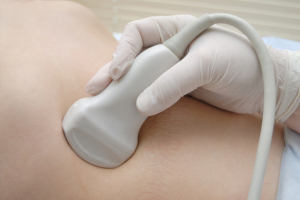by
Lauren Dubinsky, Senior Reporter | September 19, 2014
Diagnosing kidney stones with ultrasound might be as effective as CT and it leads to less radiation exposure, according to a new study published in the New England Journal of Medicine.
Right now, when physicians need to diagnose kidney stones, they will usually have the patient undergo an abdominal CT scan as the initial imaging test. Although it's very accurate and it can be performed in most hospital radiology or emergency departments, it comes along with potentially dangerous radiation, a higher cost and it can lead to unnecessary care.
Researchers at the University of California-San Francisco pooled 2,759 patients with suspected kidney stones between the ages 18 and 76 from 15 geographically diverse academic hospital emergency departments. They then split them into three groups — initial diagnostic testing by point-of-care ultrasound, radiology ultrasound or abdominal CT.
They found that after 30 days there was no significant difference between the groups in terms of complications that could have been caused by missed or delayed diagnoses. There also wasn't much of a difference in serious adverse events, pain, visits to the emergency department or hospitalization.
The pain that kidney stones cause is one of the most common reasons for emergency department visits. In 2009, it caused over 1.3 million visits and about 3,600 visits every day, according to the Agency for Healthcare Research and Quality's (AHRQ) Healthcare Cost Utilization Project 2012 data.
After a six month follow-up they found that the confirmed diagnoses were similar for all of the groups but the group that underwent a CT scan had a much higher rate of radiation exposure than the other groups. A few of the patients who underwent ultrasound also had to undergo additional testing with CT but they only had about half of the radiation exposure that the CT group had.
It's known that many patients get kidney stones more than one time — the likelihood of it recurring can be as high as 50 percent within five years of the first occurrence. "Given this frequency, the study findings can help clinicians make the best possible decisions about how to effectively diagnose kidney stones while reducing the risk for patients from potential cumulative radiation exposures," Richard Kronick, director of AHRQ, said in a statement.
However, the results don't suggest that patients should only undergo an ultrasound exam but rather that it should be the initial imaging test and then a physician should decide if additional testing with another modality is needed, Dr. Rebecca Smith-Bindman, lead author of the study, said in a statement.
Back to HCB News
